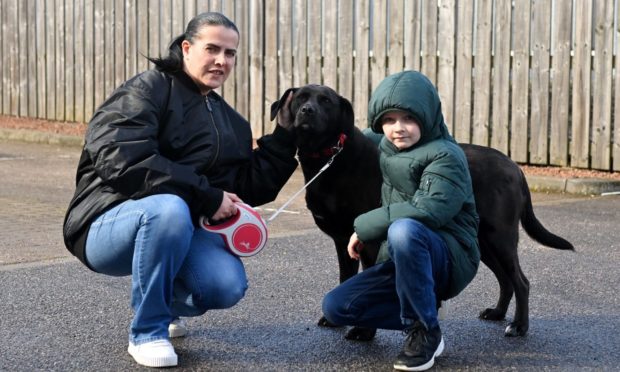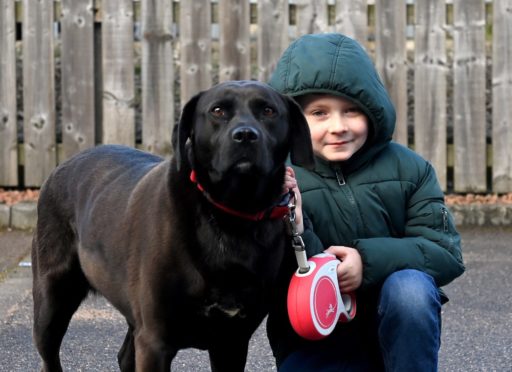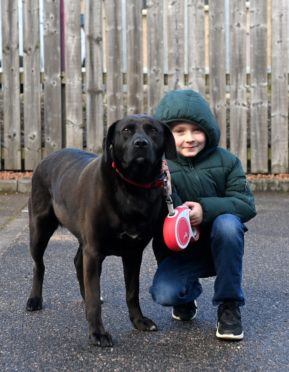An Aberdeen mum is calling for dogs to be recognised as official therapy animals for autistic children after the “amazing” positive changes in her son.
Debbie Alexander’s son Josh has autism and ADHD. He has always struggled to contain his emotions and would lash out violently when he felt angry or upset.
But since the family adopted a dog upon the advice of a mental health specialist, Josh’s temperament has completely changed.
“He is like a new boy, I can’t believe the change in him,” said Debbie, 41.
“He is a lot calmer and has been managing to control his anger, anxiety and sensory issues much better.
“Wherever he goes, the dog follows – she even sits waiting for him while he has his bath.
“The positive changes have been amazing and especially how quickly they’ve happened.”
‘Normally the house is in uproar’
But Josh and Debbie now face losing their dog due to their landlord’s rules on pets.
Castlehill Housing Association say they are not allowed animals in the building.
Debbie is appealing their decision and is now calling on dogs to be considered therapy pets for autistic individuals, in the same way a guide dog is considered a service animal for a blind person.
The family adopted Bonny the Labrador just over a month ago after Josh’s CAMHS doctor suggested that a four-legged friend might be a way to help Josh manage his stress levels.
Over the years Debbie has tried to help her son in any way possible, but whether it was medication or therapy so far nothing had offered a long-term solution.
“After we’d had her (the dog) for a week, I realised that a full seven days had gone by without a single meltdown,” said Debbie, who lives in the city centre.
“Normally after school the house would be in uproar with Josh shouting, banging doors and being violent towards me.
“Three times he has had me in hospital from lashing out. Once I had muscle damage in my chest, another time with a damaged knee cap and the third time a punch in the chest.
“The neighbours are fed-up with the noise too and have called the police in the past.”
Just as Debbie was reaching the end of her tether, a doctor specialising in children’s mental health asked if the family had ever considered getting a dog.
“The doctor told us it can be therapeutic for a child like Josh to have a dog,” she said.
“And I thought ‘well we can only try’ and if it doesn’t work then at least we will know.
“But it has worked – and it’s worked so well.
“I’d much rather have a dog than to be pumping his body with medication – he’s only eight after all.”
Dogs may assist development in autistic children
There is growing evidence that suggests the presence of a dog can help individuals with autism and ADHD.
CEO of Grampian Autistic Society Billy Alexander said: “The benefits to children, young people or any individual with an ASD (Autism Spectrum Disorder) of owning a dog or seeing a regular therapy pet are outstanding, and this should be widely supported by councils and other businesses.
“Whether you’re neurodiverse – people with conditions like autism and ADHD – or neurotypical, stroking a dog for example releases endorphins in the brain which make us feel better.
“These endorphins help induce calmness so if you’ve got mental health difficulties or a neurodiverse condition and your sensory overload is high, these endorphins just help slow everything down.
“Individuals with autism often record that they feel like they are floating out with their body looking in or their body feels very disconnected, a dog can help give that feeling of being grounded and connected to another individual and help them connect to themselves.
“It also helps them develop skills such as empathy and understand consequence and effect.
“Having no meltdowns in the first week of owning the dog is life-changing for this young man and his mum.
“Seeing her son happy and at peace must feel so nice and it will have a positive impact on mum’s mental health too, as well as benefitting their relationship.”
Rock and a hard place
However, when Debbie got in touch with Castlehill Housing Association to tell them about her situation and the improvements in her son’s health, the organisation has maintained that no pets are allowed in the building.
“A blanket policy like this is just not fit for purpose, we are working with individuals here,” said Billy.
“Councils, housing associations and other similar organisations do a great job on so many issues but have a long way to go in developing their understanding of those who are neurodiverse and their needs.”
Debbie meanwhile feels caught between a rock and a hard place.
“Obviously I knew that pets weren’t usually allowed which is why I wrote to them especially to explain everything,” said Debbie.
“And to explain how we don’t consider the dog to be a pet. She is like a service or therapy animal for Josh.
“Part of me thought Castlehill might be pleased – no more neighbours ringing them up and complaining about Josh’s loud behaviour or police being called on us.”
Debbie is now escalating the matter within the housing association and is calling for a wider understanding of how conditions like autism and ADHD can be managed with the presence of animals.
We contacted Castlehill Housing Association prior to publication but they declined to comment, stating: “We are aware of the case you raise which is currently the subject of a live appeal, so we will not comment further at this time.”



